


























At SEW-EURODRIVE, we move the world.
With an extensive installed base in the African mining industry and our commitment to providing technical support and training that will maximize equipment performance and lifespan, you can be sure of increased productivity and profitability in your mining application.

Our gear units are robust, reliable and easy to maintain and integrate perfectly into your application, whether mixing and agitation, conveying, crushing or extrusion.

SCAN HERE TO REGISTER AND CONNECT WITH SEW-EURODRIVE AT STAND P10 AT THE CTICC FROM 3-6 FEBRUARY 2025

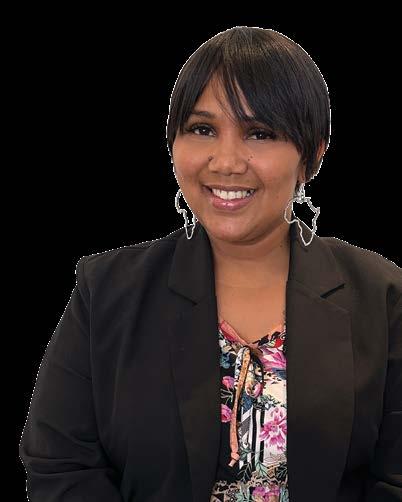


































It is with immense gratitude that I step into the role of Editor for South African Business Integrator. Taking over from Tashne, whose exceptional leadership has been a guiding light for this publication, is an honour I do not take lightly. Her passion for amplifying the voices of South Africa’s businesses and her commitment to excellence have left an indelible legacy.
With her guidance and trust, I am ready to lead this next chapter. My priority is to ensure the magazine remains a credible platform for engaging stories and thoughtful discourse within the business community.
In this edition, we feature Rand Water’s Group Chief Executive, Sipho Mosai, on shaping Africa’s future, celebrate Azilwa Managing Director Pinkie Mochumi, and esteemed economist Dawie Roodt offers his economic forecast for 2025, providing valuable insights into the country’s future.
We also take a closer look at the construction mafia phenomenon and its impact on development, explore the transformative power of Artificial Intelligence (AI) in enhancing customer experiences and driving revenue growth.
As we navigate an ever-evolving business landscape, we will highlight the innovative strategies and resilient leaders driving transformative change across industries. Together, we will empower businesses, fuel growth and inspire lasting success.
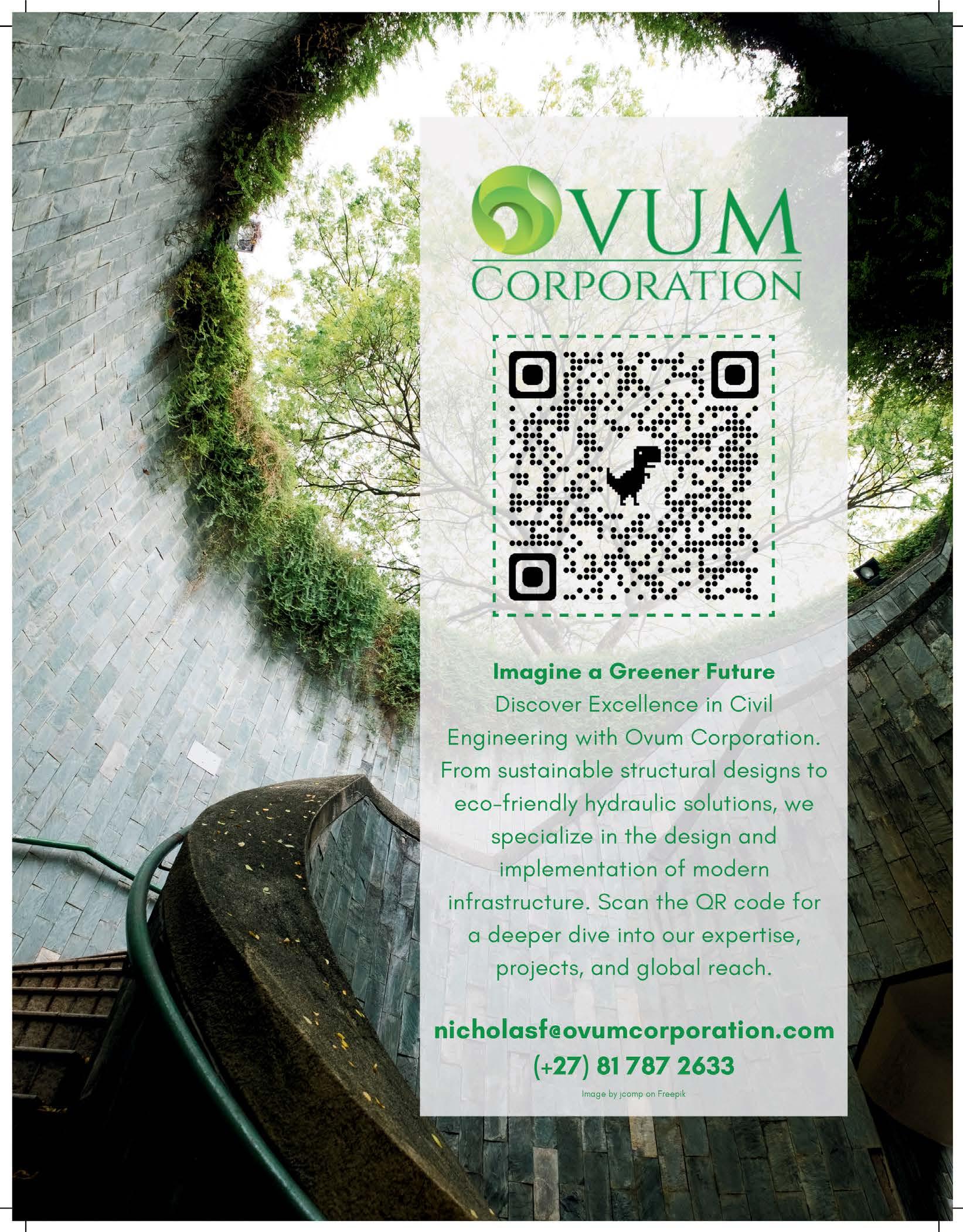




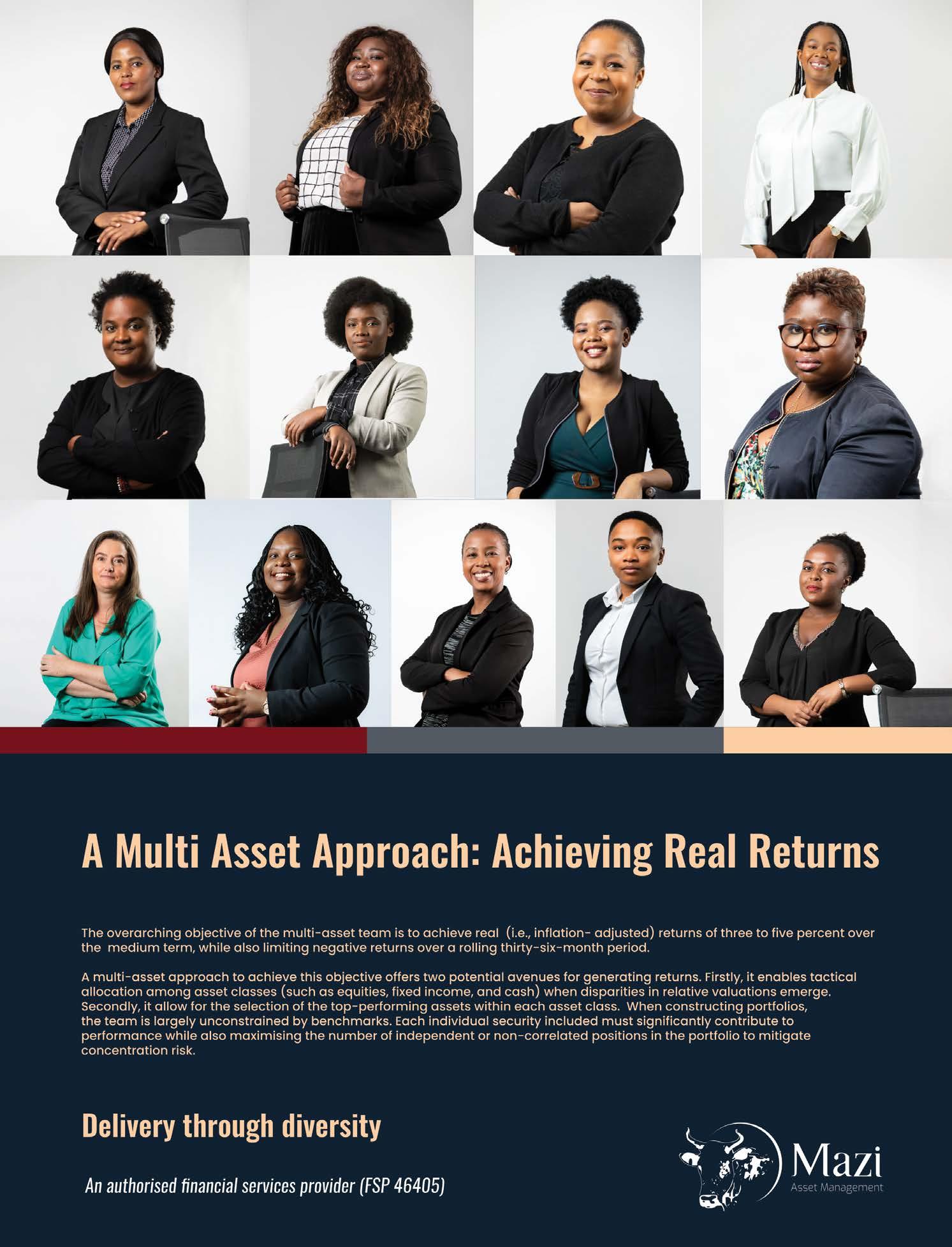

























DISTRIBUTION














Media Support | On the Dot
PUBLISHED BY

6 Carlton Crescent, Parklands, 7441 Tel: 021 424 3625 Fax: 086 544 5217










PUBLISHER
Elroy van Heerden-Mays elroy@mediaxpose.co.za
EDITOR
Tarryn-Leigh Solomons editor@sabusinessintegrator.co.za
SUB-EDITOR
Charis Torrance charis@mediaxpose.co.za
CONTENT MANAGER
Wadoeda Adams artwork@mediaxpose.co.za
DESIGNERS
Anja Bramley | Shaun van Heerden-Mays | Tia Arendse
EDITORIAL CONTRIBUTORS
Dawie Roodt
Zuko Mdwaba
Dr Bongani Mthombeni
Muhammad Ali
Sameer Kumandan

ADVERTISING SALES MANAGER
Dr Chris Blair
Lionel van Tonder
Inge Swanepoel
Martin Versfeld
Tyron Theessen
Rashieda Wyngaardt rashieda@sabusinessintegrator.co.za
ADVERTISING SALES
Tarryn Napier tarryn@sabusinessintegrator.co.za
MEDIA PARTNERSHIPS | EDITORIAL ASSISTANT
Maurisha Niewenhuys maurisha@mediaxpose.co.za
DIGITAL MARKETING MANAGER
Juhi Rampersad juhi@mediaxpose.co.za
DIGITAL AND SOCIAL MEDIA
Kyla van Heerden social@mediaxpose.co.za
DISTRIBUTION & SUBSCRIPTIONS
Shihaam Gyer distribution@mediaxpose.co.za
CHIEF FINANCIAL OFFICER
E-mail: info@sabusinessintegrator.co.za Website: www.mediaxpose.co.za
Disclaimer: The views expressed in this publication are not necessarily those of the publisher or its agents. While every effort has been made to ensure the accuracy of the information published, the publisher does not accept responsibility for any error or omission contained herein. Consequently, no person connected with the publication of this journal will be liable for any
The publisher will give
Shaun van Heerden-Mays shaun@mediaxpose.co.za
HR MANAGER
Divan Lategan hr@mediaxpose.co.za
RECEPTIONIST
Kayley Townsend receptionist@mediaxpose.co.za








Rand Water, Africa’s largest bulk water utility, stands as a pivotal force in South Africa’s water sector, largely due to the astute leadership of Group Chief Executive Sipho Mosai.
Serving over 18 million people across four provinces, the utility has proven itself not only as a critical resource for the present, but also as a future-facing entity, dedicated to overcoming the most significant water-related challenges facing the nation. Through visionary leadership, cutting-edge infrastructure and commitment to sustainability, Mosai ensures that Rand Water remains a key player in shaping the water supply landscape for generations to come.
The scale of Rand Water’s operations is immense. The utility manages an intricate network of pumping and purification stations, alongside an expansive regional pipeline system that spans approximately 3 660km. “We also have major facilities in Zuikerbosch and Vereeniging, which are central to our operations,” says Mosai, emphasising the utility’s capability in addressing the country’s complex water needs.
A historical overview
Water is not merely a resource; it is the lifeblood of society, underpinning health, sanitation and economic vitality. For the water utility, the primary mission extends beyond mere provision of water to addressing the broader needs of an expanding population. The historical roots of Rand Water trace back to 1903, with the formation of the Rand Water Board – a move that fundamentally altered the trajectory of the Witwatersrand’s water supply.
Before this, the efforts of small private companies had proven inadequate to meet the growing demand for potable water in the region. The British government, having recognised the inadequacies of previous systems following the 1902 peace deal, laid the foundation for what would become Africa’s largest bulk water utility – Rand Water.
Today, the provision of water services is crucial to supporting South Africa’s rapid urbanisation, population growth, and the intensifying effects of climate change. As cities swell and the demand for clean water continues to rise, the need for resilient infrastructure and expert management has never been more pressing.
The importance of accessible clean water is embedded in South Africa’s Constitution as a fundamental right for all its citizens. However, translating this right into reality
demands robust, well-maintained infrastructure. The country’s ageing water system, built over 40 years ago, has suffered from considerable wear and tear, leading to substantial water loss through leaks at municipal levels. Addressing these systemic issues is of paramount importance to ensure that this vital resource can be safeguarded for future generations.
In response, Rand Water continues to prioritise a sustainable and reliable water supply. The water management entity has made significant investments in infrastructure, including advanced purification plants, large reservoirs, efficient pump stations, and automated systems. These efforts reinforce their role as a vital player in the ongoing development of South Africa’s water sector.
Under the transformative leadership of Mosai, Rand Water has earned a global reputation for excellence. The utility consistently delivers water of the highest quality, meeting and surpassing both national and international standards. With an operational footprint covering over 37 000km², spanning Gauteng, parts of the North-West, Mpumalanga, and the Free State, Rand Water’s reach is vast. Mosai has enhanced operational efficiency, all while nurturing strategic partnerships and spearheading sustainability initiatives. This has positioned Rand Water as an influential thought leader in the industry.
Under Mosai’s stewardship, the utility has enhanced operational efficiency, nurtured strategic partnerships, and championed sustainability initiatives, solidifying its position as a thought leader in the water industry.
His dedication to attracting and developing top-tier talent in water services aligns seamlessly with Rand Water’s mission of cultivating a high-performance culture. The utility, which has been tasked with providing bulk water, plays a pivotal role in ensuring that municipalities, local authorities, mines, and large industries can access the essential water they require.
“It must also be noted that I have remained an advocate for corporate social responsibility and community engagement,” Mosai states, highlighting the broader scope of Rand Water’s mission. His leadership addresses both water supply needs and the socio-economic
challenges of the communities it serves. Aligning Rand Water’s operations with national development priorities, Mosai has emphasised the importance of creating a positive social impact alongside the company’s commercial goals.
A key aspect of Mosai’s approach is his focus on talent development, prioritising the cultivation of top-tier talent in water services to shape a high-performance culture within Rand Water, positioning the utility as both a bulk water provider and a pivotal partner to municipalities, local authorities, mines, and large industries reliant on reliable water access.
Expertise and leadership journey
Mosai’s career trajectory prior to assuming the role of Group Chief Executive is a testament to his expertise and dedication. Having served as Rand Water’s Chief Operations Officer for a decade, he brought an in-depth understanding of the technical and operational intricacies of bulk water services. With a scientific background, Mosai has evolved into a strategic leader capable of driving innovation and leading significant advancements in the sector.
With over 20 years of experience in the water industry, Mosai has held numerous executive roles, providing a solid foundation in executive management, technical operations, and water systems. His extensive expertise spans water infrastructure planning, maintenance, refurbishments, and project management. Additionally, Mosai has played a vital role in strategic asset management and sector development, contributing to his position on the Construction Industry Development Board (CIDB), where he chaired the Human Resources Subcommittee and the Audit and Risk Committee.
In terms of qualifications, Mosai holds a Bachelor of Science (BSc) and a BSc (Honours) from the University of the North (now University of Limpopo), a Master of Science from the University of Free State, a Postgraduate Diploma in Management, and an MBA from the University of KwaZulu-Natal.
The water utility’s infrastructure and technological innovations
Rand Water is driven by a core set of values that are fundamental to its mission of providing high-quality water services. Integrity is at the heart of everything the organisation does, with a strong commitment to transparency and ethical practices that foster trust. The company embraces a culture of collaboration, recognising that success is achieved through partnerships with various stakeholders. Rand Water’s pursuit of excellence is evident in its continuous drive to meet the highest operational standards, while its compassionate approach ensures the well-being of the communities it serves.
Rand Water’s leadership, backed by extensive expertise, consistently integrates these strategic values into every decision. Under the guidance of Mosai, the organisation has leveraged his scientific knowledge and executive management experience to propel growth, consistently improving performance and extending its impact.
The utility has embraced a forward-looking vision focused on sustainable growth. This strategy not only addresses current water supply challenges, but also prioritises long-term water distribution solutions, ensuring responsible management of water resources for future generations. Mosai’s leadership has been instrumental in securing investments in cutting-edge technologies and infrastructure to support this vision.
Significant projects under his leadership, such as the construction of Africa’s largest post-tension reservoir in Vlakfontein, Ekurhuleni – capable of storing 210 million litres – and the largest water purification plant built since democracy (Station 5A at Zuikerbosch, processing 600 million litres per day), demonstrate Rand Water’s commitment to tackling the growing demand for water with innovation.
The company’s financial performance reflects this strategic direction. With an 11.4% revenue growth to R21.8 billion, driven by cost-reflective tariffs and increased volumes, the utility has maintained strong financial results. Gross income grew by 15.3% to R7 billion, with a consistent gross income margin above 30%. Net income has surged by 29.0%, reaching R4.56 billion, a clear indication of solid financial health. This success has been achieved through a relentless focus on cost-efficiencies and strategic investments.

Mosai has ensured that Rand Water remains resilient, navigating economic challenges and a tough operating environment while maintaining a strong financial profile. Key to this success has been effective liquidity and risk management. The redemption of the RW21 bond in April 2021, followed by the RW23 bond in December 2023, both in the amounts of R1.6 billion and R1.2 billion respectively, underscores the utility’s financial stability.
Additionally, Rand Water broke new ground in Africa by becoming the first state-owned company to issue sustainability-linked bonds. This initiative, along with the issuance of three new bonds in June 2021 worth R1.7 billion, attracted over R4.5 billion in capital market bids, signalling strong confidence in the utility’s financial status. Rand Water’s innovative approach was recognised in March 2022, when it won the Bonds & Loans Africa Award for its pioneering sustainability-linked bonds.
The utility’s commitment to water preservation extends to treatment plants designed to ensure reliable water supply for communities in need. Rand Water is not only focused on present-day challenges, but is also planning for the future, investing in technologies that will continue to ensure access to clean water.
The Rand Water Institute plays a critical role in advancing innovation within the organisation. With
a focus on developing state-ofthe-art technologies to improve water supply and management, the Institute is establishing Rand Water as a thought leader in the water industry, both locally and globally. Through collaboration and knowledge transfer, the Institute contributes to the ongoing advancement of water solutions, solidifying Rand Water’s position as a leader in water management.
Managing the complexity of Rand Water’s bulk water infrastructure
Rand Water’s leadership and management have demonstrated exceptional skill in overseeing the operations of its bulk water infrastructure, ensuring reliable water supply to the organisation’s customers. To fully appreciate the effectiveness of this leadership, it is essential to understand the origins of Rand Water and its development over time.
The concept of utilising water resources was first proposed in 1954 by the Natural Resources Development. However, it was only in the late 1970s that the South African and Lesotho governments began negotiations to utilise water from Lesotho to enhance the Vaal River Integrated System. The agreement came to fruition in 1987, when a treaty was signed by representatives from Lesotho, the World Bank, the United Nations, and the European Union, formalising the collaboration.
The ambitious project began with the construction of four large dams – Senqu in Lesotho, Ash River in the Free State, Wilge River, and the Vaal Dam – which ultimately cost R9.1 billion, a significant increase from the initial R5.1 billion estimate. The first phase of the project involved the building of the Katse and Mohale Dams, along with a network of tunnels in the Highlands of Lesotho. Under the terms of the agreement, South Africa is required to pay Lesotho R150 million annually to help augment the water supply to the Vaal Dam, regardless of how much water is used. This payment ensures continued support for the water supply system.
The Lesotho Highlands Tunnel project, managed by the Department of Water and Sanitation (DWS) and the Trans Caledon Tunnel Authority (TCTA), transfers 780 million m³ of water annually from Lesotho into the Integrated Vaal River System. This water is then supplied to Rand Water customers. The scheme is designed to deliver up to 2.2 billion m³ of water annually to South Africa.
infrastructure, as well as effective water conservation measures. This includes education, pressure management, leak repairs, and enhanced revenue collection.
Water is not merely a resource; it is the lifeblood of society, underpinning health, sanitation and economic vitality."
Despite this vast water supply, concerns over nonrevenue water have been raised by both Sipho Mosai, Rand Water’s Group Chief Executive, and the public. Water losses at municipal levels, estimated at 1.6 billion litres per day due to leaks, have significantly increased water consumption across Gauteng and municipalities served by Rand Water. This has placed additional pressure on water resources.
The No Drop certification evaluates water use efficiency in municipal drinking water systems, using non-revenue water as a key performance indicator. According to the Department of Water and Sanitation’s independent No Drop report, only four Water Services Authorities achieved a score of 90% or higher, a sharp decline from 44 municipalities in 2014. The report highlighted that non-revenue water increased from 37% in 2014 to 47% in 2023. Gauteng, with non-revenue water standing at 49.5%, is one of the highest in the country. Dr Sean Phillips, Director General of Water and Sanitation, noted that high physical losses in municipal distribution systems are contributing to water supply disruptions in Gauteng.
South Africa’s average per capita water consumption is approximately 218 litres per day, significantly higher than the global average of 173 litres. Gauteng’s consumption is particularly concerning, standing at 279 litres per day. The report stressed that water interruptions in Gauteng are not due to insufficient bulk water supply, but rather due to excessive consumption driven by substantial physical losses in the municipal distribution system.
These challenges require urgent action, with a focus on improved operations and maintenance of water
Rand Water has already engaged with municipalities facing significant financial challenges and high levels of non-revenue water. A notable example is the collaboration with the Emfuleni Local Municipality (ELM) to pilot a new water services delivery model known as the Special Purpose Vehicle (SPV). The SPV will involve shareholders such as Rand Water, the municipality, and other third parties committed to investing in the upgrade, refurbishment, and maintenance of water services infrastructure. Profits generated by the SPV will be distributed to investors according to its dividend policy.
The municipality will contribute to the SPV by transferring its water services assets, which will be assessed, valued, and migrated to the SPV. Rand Water’s stake in the SPV will be based on its capital injection. The SPV will independently manage its own assets, liabilities, and resources, providing a ringfenced structure for water services.
The SPV will have a governance structure comprising non-executive directors appointed by shareholders, with a Chief Executive Officer or Managing Director selected to oversee day-to-day operations. A team of senior management will include a Chief Operations Officer, Chief Financial Officer, and other key staff. Robust governance will be ensured through committees overseeing audit, risk, and investment.
Water consumers will pay their bills directly to the SPV, ensuring that funds are strictly allocated for water and sanitation services. Additionally, water and sanitation grants that would typically be paid to municipalities will instead be redirected into the SPV to maintain liquidity.
The SPV will operate under compliance with key legislation, including the Public Finance Management Act, the Municipal Finance Management Act, the Water Services Act, and the Companies Act. It will also seek necessary permissions from relevant government departments, including the National Treasury, the Department of Water and Sanitation, and
the Department of Cooperative Governance. Extensive stakeholder consultations and a comprehensive change management process will precede implementation.
This new model promises to create a more sustainable and efficient approach to water services, with improved infrastructure, service delivery, and financial sustainability. Through innovation and collaboration, Rand Water is ensuring that future generations will have access to the vital water resources they need.
Under the leadership of Mosai, Rand Water has reached significant milestones, including the restoration of critical pump stations 2, 8, 9, and 10, and the successful operation of Sebokeng Modules 5 and 6 wastewater treatment plants. Additionally, the renovation of the Vaaloewer Water Treatment Plant has been completed, and it is now fully operational, producing water that meets all relevant quality standards.
Mosai has been instrumental in building strong partnerships with municipal customers, ensuring the sustainable delivery of high-quality water and sanitation services. These efforts have led to the establishment of Rand Water Services, a subsidiary dedicated to executing special projects and seizing water services business opportunities.
Addressing the challenges ahead
Despite these accomplishments, significant challenges remain, particularly with regards to water loss. The issue of non-revenue water – water that is produced, but not billed – has reached alarming levels, with estimates suggesting that up to 1.6 billion litres of water are lost each day due to leaks across Gauteng and other municipalities. This has profound implications for water usage and distribution efficiency.
Through the No Drop certification, which measures water use efficiency, the utility is holding municipalities accountable for their water management practices.
Rand Water efficiently coordinates, administers, and manages its Corporate Social Investment (CSI) resources through the Rand Water Foundation, supporting community development projects in collaboration with various donors and relevant stakeholders.
As Africa’s largest bulk water utility, Rand Water is a key provider of clean, safe water to millions and a driving force in the future of water resource management across South Africa and beyond. Through strategic infrastructure investments, a strong commitment to sustainability, and a focus on social responsibility, Mosai has positioned the utility to continue its leadership in securing water resources for generations to come.
Sipho Mosai is the Group Chief Executive of Rand Water since 2019. Before that, Mosai was Rand Water Chief Operations Officer for 10 years. Mosai, a scientist by training turned strategist and business leader in the water sector, boasts over 20 years executive management and technical experience in bulk and distribution water operations, water infrastructure planning, maintenance, refurbishment, and upgrade, project management, scientific services, strategic asset management, and sector growth and development.
Mosai has served as a non-executive and board member in various institutions. This includes serving on the Construction Industry Development Board (CIDB),
where he chaired the Human Resources Subcommittee of the board in his first term and the chairperson of the Audit and Risk Committee in his second term. He currently serves on the boards of the Rand Water Foundation and Rand Water Services as a non-executive director.
Mosai holds the following qualifications:
• Bachelor of Science (University of the North)
• Bachelor of Science (Hons) (University of the North)
• Master of Science (University of Free State)
• Post Graduate Diploma in Management (University of KwaZulu-Natal)
• Master of Business Administration (University of KwaZulu-Natal)

Mariam Cassim’s career is a story of grit, resilience, and a commitment to creating opportunities, especially in the financial and digital spaces. As CEO of Vodacom Financial and Digital Lifestyle Services, Cassim has led the transformation of a struggling division into a multi-billion-rand business. Her academic journey –graduating as a Chartered Accountant and earning an MBA with Cum Laude honours from the University of Cape Town – was shaped by hard work and the sacrifices of her parents, who valued education despite financial challenges.
MARIAM CASSIM | CEO OF VODACOM FINANCIAL AND DIGITAL LIFESTYLE SERVICES
In this interview, Cassim shares her passion for financial and digital inclusion across Africa, discussing the personal and professional hurdles she’s faced as a woman in a male-dominated industry.
Tell us a bit about yourself – your name, title, and professional background?
I’m Mariam Cassim – a wife, mom to two kids under 13, a daughter, a mentor and a fun-loving friend. Professionally, I’m the CEO of Vodacom Financial and Digital Lifestyle Services.
Could you share some insights into your academic background and the degrees you’ve earned?
I hold an MBA from the University of Cape Town’s Graduate School of Business, where I graduated Cum Laude. It sounds impressive, but it wasn’t an easy journey. I grew up in a modest household where my parents made significant sacrifices to ensure my siblings and I received a good education. While they did their part, it was up to us to excel academically if we wanted to go further. Through hard work, I earned bursaries and scholarships that helped me navigate my academic path.
What key experiences have shaped your career journey?
I began my career in auditing, which was part of the process to qualify as a Chartered Accountant. After qualifying, I pursued a path in corporate finance mergers and acquisitions, spending the first half of my career in that field. It provided a solid foundation, giving me a deep understanding of business valuation, financial analysis and the key drivers that matter to shareholders. However, over time, I found myself drawn to the excitement and hands-on nature of being involved in a business operationally. I then decided to pursue an MBA when my first child was just four months old, and upon graduation, I shifted my focus entirely to business operations.
This led me to join Vodacom Financial and Digital Lifestyle Services when I was seven months pregnant with my second child. I took on the challenge of transforming a loss-making entity into the multi-billionrand business it is today, contributing significantly to Vodacom’s revenue diversification strategy. Balancing the demands of motherhood and leadership was not
easy, but it became a pivotal time in my life, shaping my perspective on both business and personal growth.
Why are you so passionate about financial and digital inclusion and what challenges have you faced?
As the CEO of a fintech business within a telco, I’m committed to advancing financial and digital inclusion across Africa. My journey has had its share of challenges, both as a woman in a predominantly male industry and as someone who grew up in a financially disadvantaged household. I experienced firsthand how the lack of access to financial services served as a barrier for my parents, limiting their opportunities. This background has profoundly shaped my perspective and strengthened my resolve to make financial inclusion a reality for others.
In my career, being a woman in a male-dominated industry has come with its own set of obstacles. From navigating unconscious biases to proving my expertise repeatedly, I’ve found myself needing to stay resilient and focused on the larger purpose I serve. Early on, I realised that the way forward was to build a network of mentors and advocates who understood and valued my contributions.
On a broader scale, bringing financial inclusion to Africa has required us to overcome significant challenges, such as limited infrastructure, digital literacy and mistrust toward financial services. It’s been a journey of learning, listening, and co-creating solutions that make a tangible difference in people’s lives. For me, this mission is both personal and professional: by expanding access to financial services, we’re enhancing convenience and empowering millions of people.
Can you list some of the offerings from your portfolio of solutions that are close to your heart and why?
Several of our products are particularly close to my heart due to their transformative impact. Our consumer fintech solutions stand out by offering easy, fully digital access to funding, removing traditional barriers and eliminating the need for cumbersome paperwork. Our insurance products are equally meaningful, providing essential security that helps consumers recover quickly after losing an asset. I’m also proud of our SMME solutions, which empower small businesses through cashless payments and accessible funding options to fuel their growth.
What is your favourite professional memory?
At just 25, whilst working for an investment management company that had investments in multiple industries including telco, I received the incredible opportunity to attend the Mobile World Congress in Barcelona – one of the largest telco and tech conferences in the world – because my boss couldn’t attend and generously passed his invitation to me.
At that time, I knew very little about the telco industry, but I accepted the invitation with immense excitement and determination to learn.
I remember being in absolute awe of the speakers and the deep knowledge that they had.
Fast forward 10 years, I was invited back to the same conference, this time as a speaker, discussing the intersection of the telco and financial services industries. That moment was full-circle achievement for me, not just because I returned as a speaker, but also because no one would’ve anticipated the rapid integration between these two industries. This was proof that if you dare to dream big and believe in it, the universe will make it a reality.
harder being
Definitely being a mom – at least at the office, people listen! But seriously, both roles are challenging in their own ways. As a mom, the stakes are incredibly personal because you’re shaping a human being’s life, values and future. As a CEO, the responsibility is to steer a company toward success, impacting many lives and livelihoods. While being a CEO requires strategic decision-making and leadership, motherhood demands patience, empathy, and resilience. The truth is, each role makes me better at the other, so it’s less about which is harder and more about how they enrich and challenge me in different ways.
How do you balance motherhood and your career?
Balance is a myth. It’s more about integration. I set clear priorities and boundaries, ensuring I’m present in the moment, whether at home or work. I also rely on a strong support system both in my personal life and professional setup. Planning and time management are crucial, but so is the ability to adapt when things don’t go as planned. Being able to compartmentalise helps me give my best to each role without letting one overwhelm the other.
Do you have any pet peeves?
I have a low tolerance for negativity and a “can’t-do” attitude. I believe in finding solutions rather than dwelling on problems. I also dislike complacency because growth only happens when we challenge ourselves and push beyond our comfort zones.
Outside of your formal work setup, what do you enjoy doing?
Apart from my adventurous side, like riding thrilling and daring roller coasters with my kids, I also find a lot of joy in perfecting my culinary skills. Cooking is my creative outlet and a way to unwind. It’s a grounding experience that helps me relax after a high-pressure week. And then, of course, having a set exercise routine also assists with stress relief and keeping healthy.

What do you want to be remembered for?
I want to be remembered as someone who led with empathy and vision, someone who inspired others to reach their full potential, both personally and professionally. Giving back is ingrained in my DNA and being remembered as someone who made a positive impact on society is something I strive for daily.


The rules of business process outsourcing (BPO) are being rewritten, thanks to AIpowered innovations that are redefining customer experience, operational agility, and business outcomes.
The BPO sector in South Africa is experiencing rapid growth, projected to exceed $1.89 billion by year-end. Amidst this dynamic landscape, companies face increasing pressure to innovate and deliver exceptional results, a challenge that Digital Solutions Group (DSG) has risen to meet.
DSG wins Top Support Services Provider
For the second consecutive year, DSG has won the Top Support Services Provider Award at the prestigious BPESA GBS and BPO Alchemy Awards. This accolade highlights DSG’s ability to revolutionise customer engagement and service delivery through cutting-edge technologies, including AI-enabled advertising, digital live chat, and a fully managed mobile virtual network (MVNO).
DSG’s proven approach is built on consistency. The organisation believes in providing tailored solutions to its customers across various industry sectors, delivering outcome-focused results. Its offerings include inbound and outbound
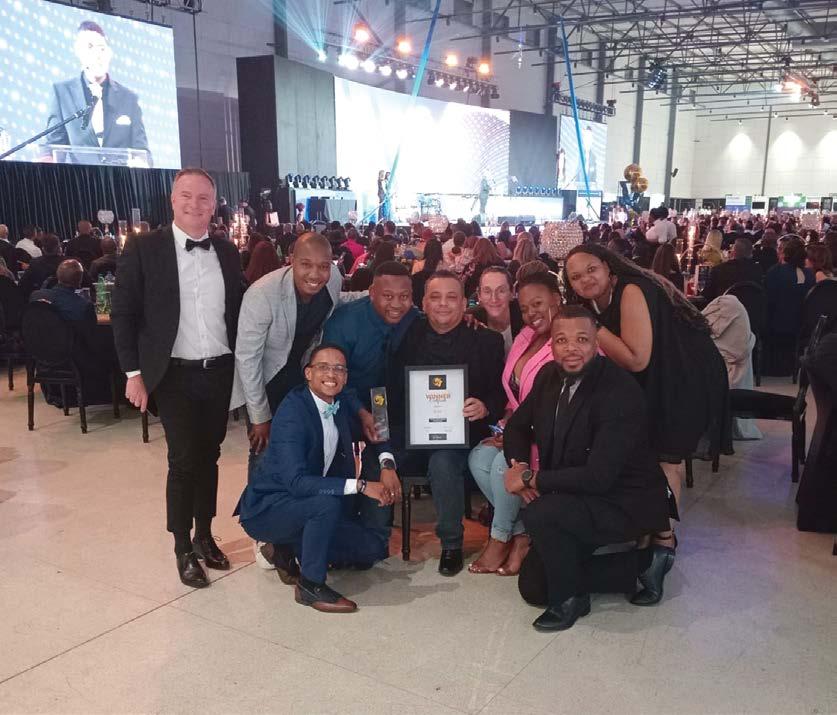
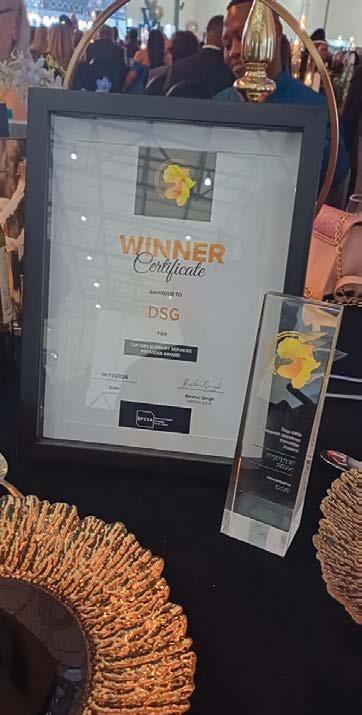

customer support, lead generation, sales activations, digital live chat, and advanced AI-driven solutions. These services have redefined industry standards by ensuring seamless customer engagement, operational efficiency, and measurable results.
“Reliability and innovation drive everything we do at DSG,” says Yaron Assabi, founder of Digital Solutions Group. “This award builds on our proven reputation in the market and reflects our team’s dedication to excellence, collaboration, and innovation. We are honoured to be recognised for our efforts in driving transformative outcomes for our clients.”
Across industries, organisations face mounting pressure to streamline costs while driving revenue. Advanced technologies like AI and digital automation are pivotal in driving efficiency and enhancing customer engagement. DSG’s AI-powered solutions deliver measurable efficiencies, such as an 80% reduction in time-to-market for digital advertising campaigns. Additionally, DSG’s management of live chats for clients, handling 1.8 million interactions annually, ensured an industry-leading CSAT score of 93%.
“Companies need to continually innovate and scale their services to stay competitive,” says Assabi. “By leveraging AI, digital customer experiences, and mobile virtual networks, DSG has enabled the client to streamline operations, reduce costs, and support its digital transformation strategy.”
Reliability and innovation drive everything we do at DSG."
As broadcasters diversify their solutions, DSG assisted a client in establishing a full MVNO. By managing the entire process from customer onboarding to device activation, DSG has grown the subscriber base to over 180 000 active users, supporting a critical revenue stream as the client looks to expand on its value proposition. This highlights how digital innovation can transform not just customer experiences, but also the operational capabilities of a business.
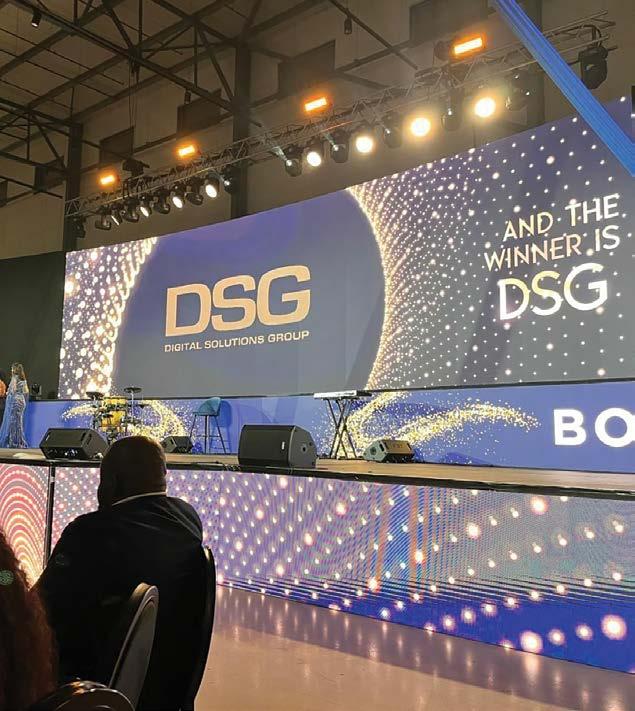
A commitment to innovation and excellence
Adaptability and innovation will continue to define DSG’s future. As a result, the company is setting the standard, ensuring its clients remain adaptable and innovative in an ever-evolving digital landscape.
“Our commitment to innovation and collaboration enables us to deliver scalable, outcome-driven solutions that help clients overcome challenges, scale operations, and achieve measurable success,” says Brandon Meszaros, the CEO of Customer Experience Group (CXG) within DSG. “This award reinforces our dedication to making a tangible difference in the evolving BPO landscape all whilst changing lives.”
As the BPO industry continues to evolve, DSG remains at the forefront, driving impactful change and setting new standards for service excellence. “We aim to create new job opportunities in BPO, particularly in customer experience (CX) and cybersecurity,” concludes Meszaros. “We are committed to creating more South African jobs by serving local and international clients and augmenting their operations with our talent.”

To realise the promise of AI in Africa, we need to make AI work for employees.
By Zuko Mdwaba, Salesforce Area Vice President/Africa Executive and South Africa
Just as generative AI continues to open opportunities for businesses in Africa to change customer experiences and increase revenue, the benefits for workforce strategies and employees can be significant.
Indeed, executive urgency to incorporate AI tools into business operations has increased seven times over the past six months, according to Slack research.
The AI-powered future of work isn’t just about efficiency, it’s about employee experience – and it promises to redefine everything from careers to culture. But to make this future a reality, AI has to work for workers. Businesses need to create a workplace where humans and AI agents work successfully side-by-side.
To help employees understand where they are on their AI journey – and leaders know how best to support them -Slack’s Workforce Lab identified five distinct AI personas in the workplace today.
The biggest group currently are ‘Maximalists’ (30%), who use AI multiple times a week to improve their work. Next are ‘Undergrounds’ (20%), those who use AI often, but are hesitant to share with their colleagues that they are doing so.
Whereas ‘The Rebels’ (19%) avoid using AI and consider it unfair when coworkers engage with these tools, Superfans (16%) are excited, but aren’t yet making the most use out of it at work. Observers (16%) have yet to integrate AI into their work. They are watching with interest and caution.
The benefits of AI adoption
By not adopting AI now, companies and employees alike risk missing out on tangible benefits – from improving efficiencies, to overall performance and productivity, to wellbeing.
Empowering employees to leave repetitive tasks to bots, so they can focus on more meaningful work isn’t just good for employees, it’s also good for business.
At Salesforce, we prioritised four enterprise-wide solutions designed to help enhance goal-setting, automate daily tasks, find information faster, and streamline support – all while freeing up our employee success and IT teams to focus on more complex tasks.
Key actions for leaders
Making AI work for workers requires leaders reimagining how they develop and train every part of their organisation. With perspectives and experiences of AI among desk workers varying so widely, a tailored approach to AI enablement is essential to setting every employee up for success.
Three key actions leaders can take to encourage AI adoption are creating a culture of continuous learning, giving visibility to use cases of AI, and encouraging experimentation.
Clear permission, guidance and training are critical to fostering AI adoption. Only 15% of desk workers say they have the education and training necessary to use AI effectively. Those who are trained to use AI are up to 19x as likely to report that AI is improving their productivity.
Sharing how others are using and benefiting from AI tools and troubleshooting AI use cases will help clarify AI norms and encourage more employees to share their own AI teachings.
Thirdly, the benefits of creating a trusted environment where teams feel supported to try new technologies are clear. Desk workers who feel trusted by their employers are 94% more likely to have tried AI for work-related tasks.
This explains why at Dreamforce 2024, Salesforce announced plans to expand access to skilling
opportunities with free AI training for anyone. The company will waive all fees for its paid instructor-led courses and credentialing through the end of 2025, totalling an anticipated $52 million investment.
To support these efforts, Salesforce will open new spaces at its San Francisco headquarters, including a pop-up AI Centre for in-person community AI training courses, and dedicated floor for employees to skill up on AI tools and agents... Salesforce’s new offerings will help skill up the workforce to address this AI skills gap and set up workers for success now – and in the future.
Across the company, Salesforce is helping upskill its 72 000 employees by introducing global quarterly AI learning days to give employees hands-on time with the latest AI innovations.
As we build a culture of experimentation and encourage people to find ways to improve work with AI, we also have to change how we measure impact.
Rather than tracking productivity through activity metrics like time spent on tasks, we should focus on outcome-based metrics, such as customer satisfaction and innovative product development. This shift encourages employees to move beyond busywork and leverage their creativity and tools to achieve meaningful results.
As AI innovation and workplaces continue to change fast, employers must evolve to help employees – and ultimately their customers – be successful. Ensuring employees collect different experiences, skills, networks, and expertise with AI will allow them to thrive in the AI-driven future.
Making AI work for workers requires leaders reimagining how they develop and train every part of their organisation. Three key actions leaders can take to encourage AI adoption are:
• Creating a culture of continuous learning
• Giving visibility to use cases of AI
• Encouraging experimentation
Cybercrime poses a significant threat to South African small businesses. With 74% of breaches resulting from human error, expert Faiez Hartley urges SMEs to prioritise cybersecurity.
As South African small businesses go digital, they become prime targets for cybercriminals. Accenture’s study, Cost of Cybercrime, found that 43% of global cyberattacks focus on SMEs with limited cybersecurity defences.
Faiez Hartley, head of IT at Business Partners Limited, warns that many small business owners in South Africa underestimate their vulnerability to cyberattacks. “Cybercriminals exploit gaps in defences, causing significant harm that can, in some cases, lead to business closure. It’s imperative that SMEs in South Africa recognise the urgency of investing in cybersecurity.”
A single cyberattack can devastate a small business, with the average data breach in South Africa costing around R53.1 million, plus operational downtime, lost customer trust, and potential legal fallout. “The direct financial implications are just one aspect of the damage,” Hartley explains. “What’s often overlooked is the long-term impact on customer relationships and brand reputation. A breach can lead to a loss of confidence from both consumers and business partners, which is often very hard to regain.”

Data breaches can be catastrophic for SMEs, entailing costly incident management, reputational damage, and potential fines under POPIA. Noncompliance with this acts’ stringent data protection measures can lead to severe penalties and legal repercussions.
Verizon’s 2023 report reveals that 74% of data breaches result from human error, typically due to inadequate employee training or cybersecurity awareness. “Many SMEs believe they are too small to be targeted by cybercriminals, but this couldn’t be further from the truth,” says Hartley. “No business is too small to be affected. In fact, the smaller the business, the more devastating the impact of a cyberattack can be.”
The most significant threats include phishing attacks via email, which can lead to fraud, and malware (ransom) attacks often linked to malicious links or files from unknown senders that are opened. Password attacks are also prevalent, typically resulting in complete compromise, including elevated rights and ownership by attackers. SMEs with remote or hybrid work arrangements face increased risks. Employers should be particularly concerned about employees using unprotected networks, which can lead to unsecured access to critical corporate software and data, often without adequate cybersecurity protections.
Hartley stresses the importance of investing in cybersecurity, but also emphasises that effective defences don’t have to be expensive. “It is an investment, but basic measures such as firewalls, anti-virus software, and regular system updates can go a long way toward protecting a business from cyber threats.” He further notes the importance of cultivating a strong culture of cybersecurity in the workplace. “One of the most critical aspects is employee training. Introducing multi-factor authentication instead of just a password and providing regular training sessions that teach staff to recognise phishing attempts and identify suspicious online activity can significantly reduce the risk of human error leading to cyber breaches.”
To mitigate cyberattack damage, every SME needs a comprehensive incident response plan. This plan should detail post-attack protocols, including key contacts, damage control, and stakeholder notification, enabling swift and effective crisis management.
“Cybersecurity is not just an IT issue –it’s a business issue. SMEs need to take proactive steps to protect themselves, their customers, and their future. While the costs of implementing proper cybersecurity may seem high, the cost of ignoring it could be far higher,” Hartley concludes.
Protect your business
1. Implement firewalls and anti-virus software
2. Conduct regular system updates and security audits
3. Introduce multi-factor authentication
4. Provide regular employee training sessions
5. Develop a comprehensive incident response plan
Stay informed
1. Stay up-to-date with cybersecurity news and trends
2. Participate in cybersecurity workshops and webinars
3. Join cybersecurity communities and forums
Best practices
1. Use strong passwords and password managers
2. Use encryption for sensitive data
3. Regularly back up critical data
4. Monitor network activity and system logs

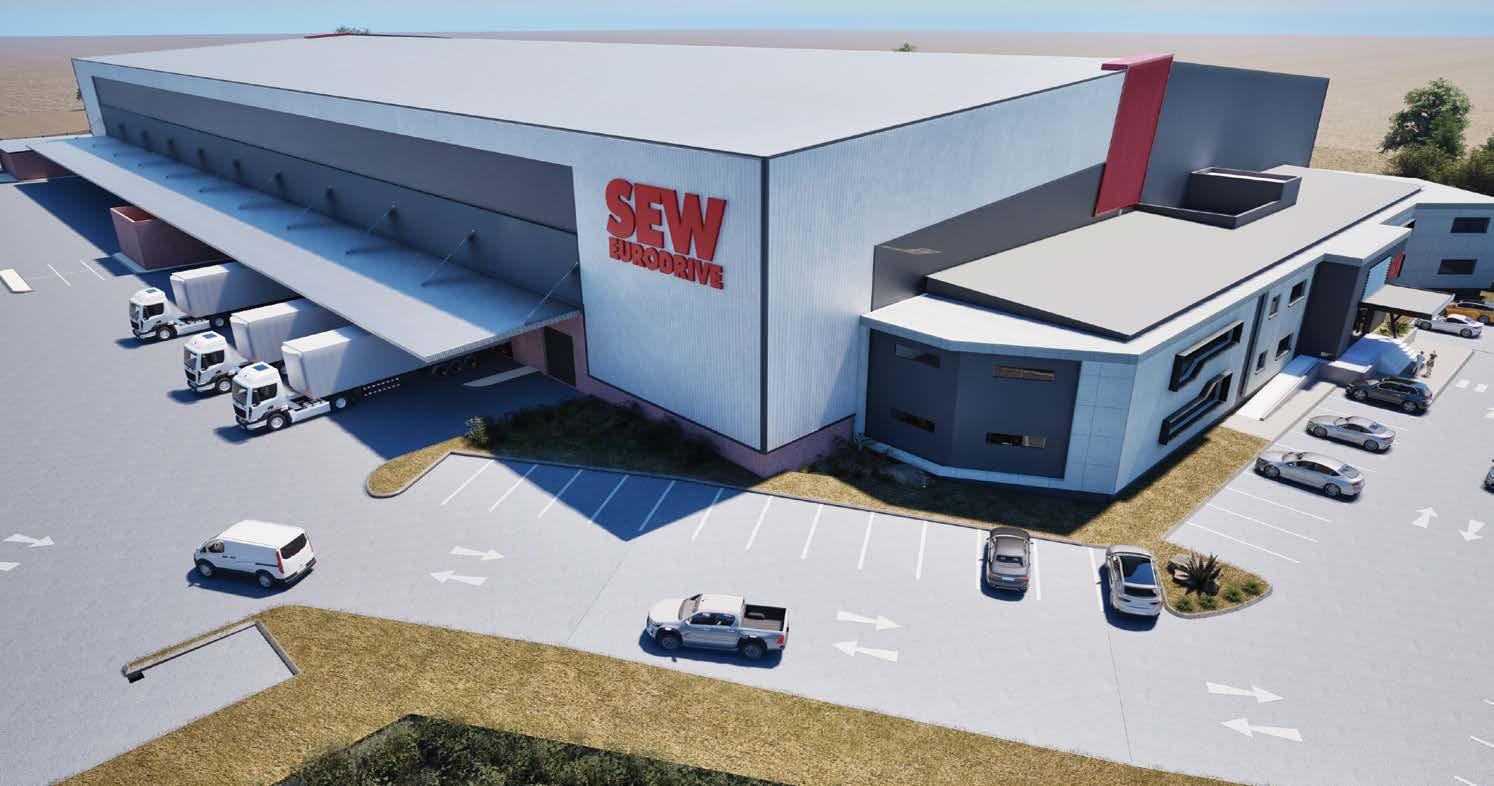
SEW-EURODRIVE is strengthening its presence in Africa with a significant investment in a cutting-edge facility. This strategic move underscores the company’s confidence in the region’s growth potential and its commitment to innovation.
SEW-EURODRIVE South Africa is advancing its strategy to “close the loop” in drive and control technologies with the development of a new 17 000m² Service and Repair Centre. Located next to its headquarters in Aeroton, Johannesburg, this facility addresses the critical need for expert gearbox repair services in Africa. Groundwork began in September 2024, with completion expected by November 2025 and occupation in early 2026.

This initiative marks Phase 2 of the company’s local expansion. Following a R500 million investment in its 26 000m² headquarters complex in 2022, SEWEURODRIVE has committed an additional approximately R384 million to the new centre, reflecting its confidence in Africa’s growth potential. The investment is part of the company’s global €1 billion service capability expansion in 2024.
The centre will feature full-service and repair capabilities, including sandblasting, spray painting, motor rewinding, assembly and load testing. A fabrication section will
manufacture components such as baseplates and guards, while a 30-bay assembly area will handle over 300 repaired units monthly. Additionally, an expanded DriveAcademy and IT centre will address skills shortages by providing advanced training.
SEW-EURODRIVE’s vertical integration approach ensures high-quality service and repair capabilities for its own and competitors’ gearboxes, reducing reliance on external contractors. This positions the company to fill market gaps where competitors often lack comprehensive support services, bolstering its market share and fostering sustainable growth.
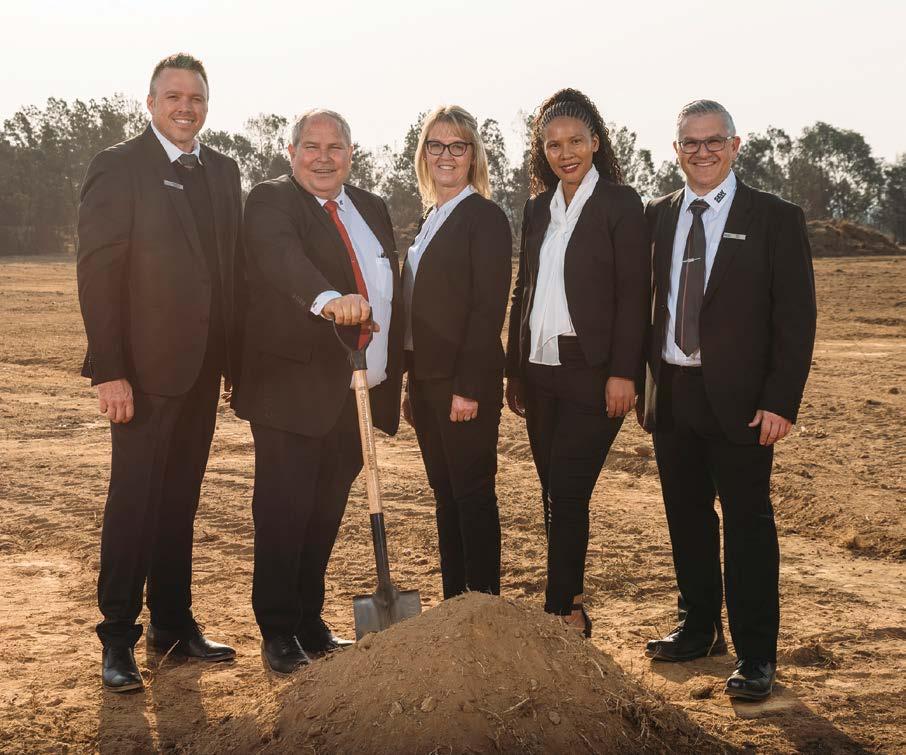
With this development, SEWEURODRIVE aims to deliver a full-service experience, crucial for industries like mining that prioritise reducing operating costs and total cost of ownership. The project is expected to create 80 to 100 skilled jobs, reinforcing SEW-EURODRIVE’s commitment to innovation, customer service, and long-term growth in the region.

As we reflect on 2024 – a year defined by significant economic shifts and recalibrations – South Africa’s journey offers valuable lessons and insights. With global trends and domestic policies continuing to influence the nation’s economic landscape, the country finds itself at a critical juncture. To unpack these complexities, Dawie Roodt, founder, director and chief economist of the Efficient Group, offers his expert analysis.
DAWIE ROODT | FOUNDER: EFFICIENT GROUP

In this Q&A, Roodt reflects on the challenges and triumphs of the past year, evaluate the performance of key sectors and provide forecasts for the year ahead. From domestic policy shifts to global influences, his insights shed light on South Africa’s economic trajectory and the opportunities that lie ahead.
Reflecting on 2024, what do you consider to be the most significant economic developments or challenges South Africa faced?
Several key developments have positively impacted the landscape. First and foremost, the country appears to have made significant strides in overcoming load shedding. While this progress is largely attributed to the private sector’s increasing investment in renewable energy, particularly through solar panel initiatives, it is undoubtedly a positive outcome. The lack of reliable electricity had been a major impediment to economic growth, so this improvement is certainly encouraging.
The most significant event was the national election, which carried considerable weight for various reasons. Notably, the establishment of a government of national unity has proven to be a stabilising factor so far. Equally important is the fact that the ANC has acknowledged

the loss of substantial support, signalling that South Africa’s democracy is maturing, which is a promising development for the country’s political stability.
From an economic perspective, another crucial milestone is the conclusion of the monetary tightening cycle. With interest rates now beginning to decrease, this shift is expected to have a positive impact on economic conditions moving forward.
On the international front, ongoing geopolitical tensions, including various conflicts, remain noteworthy. Additionally, the re-election of Donald Trump as the U.S. President is a key political development that will require close attention, given its implications for global stability.
How have recent government policies and interventions impacted South Africa’s economic growth and stability in 2024?
While South Africa currently operates under a government of national unity, there is no lack of policy clarity in the country. The economic policies remain consistent, driven predominantly by the ANC which retains its influence within the unity framework. The ANC’s ideological stance and policy framework, which
include expropriation and a developmental state model, are well-established and clear.
However, these policies, coupled with systemic inefficiencies, instances of outright incompetence and recurring corruption, have contributed to the country’s prolonged economic stagnation. This misalignment between ideology and effective economic strategy is a significant factor behind South Africa’s weak economic growth trajectory.
While the government of national unity may offer some optimism for marginally improved economic prospects, it is essential to recognise that continuing the same strategies and approaches that have underperformed for decades will likely yield similar results. The outcomes of recent years underscore this trend, with limited progress made toward sustainable economic growth.
That said, there remain potential opportunities for improvement, and the unity government could provide a platform for incremental progress, albeit within a challenging and entrenched policy environment.
In your view, how have key sectors such as agriculture, manufacturing, mining and services performed in 2024, and what are the prospects for growth in 2025?
Agriculture in South Africa is thriving, showcasing the expertise of local farmers, though it remains vulnerable to weather challenges like drought. Despite this, it continues to be a key bright spot in the economy.
Manufacturing, however, is struggling, hindered by a weak skills base, powerful labor unions, and restrictive policies, limiting its potential for growth and job creation. The mining sector is also stagnating, primarily due to leadership issues, with progress unlikely without changes in approach.
The service industry is performing relatively well and shows promise for future growth, especially in 2025. However, skills shortages remain a challenge. A positive development is the inclusion of foreign professionals, or “swallow workers,” which is a boost for the sector. Despite its growth, the service industry is unlikely to generate significant job opportunities.
What lessons can businesses, policymakers, and
South Africans take away from the economic trends and outcomes of 2024?
The one clear lesson I’ve taken away is that, despite their differences, political enemies can unite to form a functional government. It’s been surprising to see this work. When it comes to policymakers, they must understand that private sector involvement is vital. The electricity situation, for example, underscores this point. Ultimately, private sector participation is crucial to solving many of South Africa’s economic woes.
As for business, there aren’t many lessons left to learn. The biggest takeaway now is that, ideologically and politically, South Africa is unlikely to change significantly. However, I do hope that policymakers have recognised just how much the private sector is contributing to the economy.
With the upcoming State of the Nation Address and national budget speech, what key announcements or policy directions should South Africans be anticipating?
The State of the Nation Address is important for the President to maintain the government of national unity, especially with internal ANC divisions. His focus will likely be on unity, despite ongoing scandals like Phala Phala. While there will be grand announcements about economic growth, the policies in place are flawed, so not much will come from that.
The G20 summit will be highlighted as a positive for South Africa, and the budget may see some improvements if the Minister of Finance can manage fiscal accounts and possibly secure a rating upgrade, which would benefit inflation and the exchange rate. However, challenges remain, particularly with the civil service wage bill and struggling state-owned enterprises.
I’m optimistic about moderate economic growth in 2025, possibly between 1.5% and 2%, though not much higher due to existing policies. Inflation should remain around 4-5%, which is in line with the Reserve Bank’s target. Employment may improve slightly, but not enough to make a significant dent in the unemployment rate. Interest rate cuts are likely.
International risks, especially from the volatile Trump administration and potential disruptions like oil price hikes, could impact South Africa. These external factors are key uncertainties for the year ahead (2025).

The condition of South Africa’s government-owned assets and deteriorating infrastructure is a serious challenge that frustrates citizens and businesses daily. But key issues like water management, hospitals and logistics in the country can be turned around using locally-developed solutions, according to South African-based enterprise asset management company Pragma.

The South African government manages over 93 000 buildings and 74 hospitals. Many of these assets, belonging to municipalities and state-owned enterprises, have tremendous potential for improvement and revitalisation.
Pragma has developed advanced solutions for maintenance and asset management issues which are being implemented locally and exported beyond our borders.”
Bani Kgosana, Chief Revenue Officer at Pragma, explains, “Scheduled maintenance enables best outcomes. Eskom has shown the impact of maintaining its electricity generation and transmission fleet over the last year which has led to more than six months without loadshedding.
“Pragma has developed advanced solutions for maintenance and asset management issues which are being implemented locally and exported beyond our borders. These homegrown solutions have the potential to not only improve maintenance for government-owned assets but optimise them for the greater good of South Africans and our economy.”
The company is a specialist enterprise asset management business headquartered in South Africa with enterprise clients in 46 countries. With roots in engineering consulting, it helps industrial businesses and municipalities maximise their return on asset investments to support highly functional and reliable operations.
“Pragma’s On Key enterprise asset management software enables the end-to-end management of maintenance processes and resource allocation. Resources, including third-party contractors, are tightly managed to remove the risk of work falling behind, jobs completed poorly, or work dragging out due to unprepared or poorly skilled teams not being able to complete the work. An added benefit for contractors is that work is allocated to the most suitable contractor closest to the job. This ensures contractors can respond quickly, complete the job and conclude administrative processes in On Key to get sign-off and submit their invoices. This saves time and costs,” adds Kgosana.
Pragma’s network of contractors is located across the country. A stringent accreditation process ensures that contractors with the right set of skills are identified and trained to legislated standards. Aspects such as hourly rates, the time required to perform a job, and best practices are agreed upon with the client and contractors and set up in On Key. Spare parts are also specified to ensure that the correct spares are used to prevent re-work due to poor quality. Doing the job properly eliminates the need to revisit sites, saving time, fuel and costs.
“With this approach, Pragma administers the efficient and quick distribution of work to smaller contractors. Instead of a big behemoth making money from government, much maintenance work is outsourced to smaller businesses, ensuring much-needed business for smaller contractors. Our approach has created significant job opportunities for regional SMEs,” says Kgosana.

Several municipalities, as well as public-private partnerships in the healthcare sector, have seen positive results from using Pragma’s services. “We, for example, are the technology partner for Tsebo on facilities management at Albert Luthuli Hospital in KwaZulu-Natal, one of the best-run public hospitals in the country and this showcases the potential for broader application.”
With Pragma’s active engagement, the electrical support services department of a large metro reported a 2 500% increase in operational output, with accurate asset data driving improved decision-making and reporting. Centralised communication streamlined scheduling, job tracking, and bottleneck identification, while standardised work planning enhanced control.
Managing the fleet’s tyres in the metro’s refuse department saved R10 million annually and reduced overdue vehicle services by 90%.
Pragma’s On Key offering focuses on:
• Intelligent asset register: Creates a detailed asset register with scalable maintenance plans.
• Work management: Streamlines operational processes to ensure timely maintenance and repairs.
• Supplier material management: Manages suppliers, spares and spending to enhance service delivery and efficiency.
“If the same commitment to planned maintenance that we eventually saw at Eskom can be implemented by water management, healthcare, building management sector, and other utility management sectors, the impact on our country will be immense.
“I invite industry stakeholders, government officials, and potential partners to join us in revitalising our nation’s infrastructure. Together, we can forge a path toward sustainable growth and restore confidence in South Africa’s capabilities,” concludes Kgosana.
Established in 1990, Pragma is an engineering services company that delivers enterprise asset management solutions geared for industry. It provides smart asset management solutions, specialised management practices and supporting software applications to a diverse asset-intensive client base in the mining, manufacturing, public infrastructure, retail and corporate facilities, renewables and oil and gas sectors to perform at their peak while balancing asset performance, cost and risk.
Pragma’s offering is a blend of services – from consulting and business process outsourcing to condition monitoring and training. Passionate about innovation, the company continually invests in its suite of software products and related technologies.
Headquartered in South Africa, Pragma has a global footprint with regional offices and representation in Europe and Mexico. Partnerships with various companies worldwide takes services into many more territories.

At TRAC, we prioritise proactive measures over reactive responses. As part of our commitment to ensuring the safety and efficiency of the Maputo Corridor, we conduct daily route patrols. These patrols are carried out by our dedicated road patrol and emergency response units, aptly known as TRACAssist.
TRACAssist, together with the TRAC Helpdesk, is available 24/7/365 to assist road users with emergencies, incidents or queries along the Maputo Corridor.
The adoption of standards not only enhances a company’s internal structure, governance, and assurance, but also opens doors to financial opportunities. Business owners can leverage these standards to secure funding grants from SEDA and participate in beneficial enterprise supplier programmes.
By Muhammad Ali, Managing Director, World Wide Industrial & Systems Engineers (WWISE)
Broad-Based Black Economic Empowerment (B-BBEE) will always be a topic of heated debate in South Africa. Depending on an individual’s or organisation’s political leanings, it is viewed as either positive or negative, with few grey areas in between. Although BEE compliance is not compulsory for private businesses, the government’s transformation policy makes it nearly impossible for firms to obtain licences or bid for tenders without meeting the stipulated BEE requirements.
However, many private sector companies – particularly those classified as Qualifying Small Enterprises (QSEs)

– fail to recognise that complying with transformation targets can be achieved through the effective implementation of standardisation policies and practices.
QSEs are businesses with an annual turnover of between R10 million and R50 million. They are scored on the B-BBEE elements of ownership, skills development, management control, enterprise and supplier development, and socio-economic development. If they meet certain transformation targets, they are eligible to qualify for grants of up to R100 000 from the Small
Enterprise Development Agency (SEDA), as well as other enterprise funding programmes in the country.
QSEs are prevalent in manufacturing and engineering, ICT and telecommunications, construction, and real estate, and can greatly benefit from standards set by the International Organisation for Standardisation (ISO), the global body responsible for setting uniform standards for companies and organisations worldwide.
Implementing ISO standards for BEE-qualifying work
ISO standards help these industries meet regulatory requirements, improve governance, and assure clients of their commitment to quality and safety – all key factors in securing BEE-qualifying work. The government frequently requires construction firms and subcontractors that adhere to safety, environmental, and quality standards for its projects, as well as automotive, food processing, and packaging suppliers and manufacturers that demonstrate the ability to deliver quality and safety through ISO certification. Similarly, ICT service providers with expertise in data protection have a fantastic opportunity to win contracts from corporate and government clients.
There are several key ISO standards that businesses should implement to qualify for BEE work. These include:
• Quality Management (ISO 9001): Ensures that products and services consistently meet customer and regulatory expectations.
• Risk Management and Compliance (ISO 31000): Helps businesses effectively manage and mitigate operational risks.
• Health and Safety (ISO 45001): Critical for industries where workplace safety and compliance with labour laws are key concerns.
• Environmental Management (ISO 14001): Necessary for businesses seeking to manage their environmental impact and comply with sustainability regulations.
• Data Security (ISO/IEC 27001): Essential for IT companies and other sectors handling sensitive information that need to protect client data.
The ISO implementation process
QSEs should begin implementing ISO standards as soon as possible, particularly if they aim to pursue government or large corporate contracts, as early adoption positions businesses to meet BEE tender requirements. Since the ISO implementation process takes between three and six months, it is essential to start during expansion planning or as part of a long-term growth strategy.
The process begins with an initial assessment (gap analysis), followed by planning, resource allocation, and actual implementation. During these phases, the necessary policies, procedures, and systems identified in the gap analysis are put in place. These include process mapping, staff training, infrastructure upgrades, and internal audits.
“The adoption of standards not only enhances a company’s internal structure, governance, and assurance, but also opens doors to financial opportunities.”
Once the QSE is confident that all processes comply with the ISO standard, it should engage an accredited certification body to conduct a formal audit. The certification body will assess compliance, issue the ISO certification, and provide recommendations for continuous improvement.
As the standard is implemented, numerous internal changes will occur within the QSE, ultimately positioning the company to bid for BEE-qualifying work. These changes will inevitably include improved documentation, detailed record-keeping, and enhanced staff training on new procedures, especially in quality control, safety, and risk management.
However, it is vital that the organisation’s management team actively drives a culture of continuous improvement, incorporating regular internal and external audits into the business routine to maintain ISO certification. These changes will ensure the business remains structured, accountable, and compliant, crucial for securing BEEqualifying work and long-term sustainability.
With a career spanning over two decades, Azilwa Managing Director Pinkie Mochumi, has navigated the complexities of the corporate world, emerging as a respected leader and entrepreneur.

Can you describe your professional journey leading up to your appointment as Managing Director of Azilwa? What pivotal moments have shaped your career path?
My professional journey began at Eskom Megawatt Park, where I spent eight transformative years. I then moved to the Orange Company, where I experienced a pivotal turning point. I resigned without concrete plans, seeking work that aligned with my purpose.
My managing director granted me garden leave to reflect and ensure I was making the right choice, and I travelled to Israel for self-discovery. After a nine-month career break, I started Azilwa in 2013, working from my kitchen table. This humble beginning marked the start of a journey that led me to become the managing director of a company I built from the ground up.
What was the core vision behind the founding of Azilwa, and how did you identify the market opportunity that the company addresses? The core vision behind founding Azilwa was centred on freedom – the freedom to be myself, to work on my own terms, and to escape the confines of traditional corporate life. I wanted to create a life where I could “live a little more” – embrace a more relaxed and
authentic approach, even if it meant swapping corporate suits for jeans and a t-shirt. It wasn’t just about changing how I worked; it was about redefining what work could mean to me and those I served.
When I started Azilwa, I was already an experienced company secretary with a deep passion for governance and training. I believed in the power of knowledge and empowerment, and I wanted to bring that to the forefront of what I did. I saw an opportunity – an untapped need for outsourced company secretarial services, particularly from a black-owned business that could bring a fresh perspective and create real impact.
It wasn’t a common idea at the time, but I knew there was space in the market for a company like Azilwa. I wanted to show that it was possible to do things differently, to create a business rooted in freedom and integrity, while delivering exceptional value to clients.
Azilwa began as a reflection of my personal vision, but it has evolved into something far greater: a platform for transformation, a testament to the power of bold choices, and a thriving corporate entity that I must continually ground in the values and purpose that inspired its creation.
What have been some of the key challenges you’ve encountered in scaling Azilwa, and how have you navigated those obstacles?
Scaling Azilwa has presented two significant challenges: skills retention and company liquidity. As a leader, I invest in my team’s growth, but many move on to pursue other opportunities. While it is a source of pride, it is also a challenge to maintain continuity. I have come to see this as part of our purpose – shaping careers and creating a legacy of excellence.
Managing cash flow and ensuring financial stability is an ongoing balancing act that requires vigilance, strategic planning, and adaptability. These challenges have taught me the value of resilience, adaptability, and leading with focus and determination.
In your leadership role, how has your approach evolved over time, and what leadership principles do you prioritise in managing Azilwa?
My approach to leadership has evolved to prioritise empowerment, trust and growth. I give my team full ownership of their portfolios, encouraging them to take responsibility and make decisions independently. This trust allows them to innovate, problem-solve and grow into their own leadership potential.
I have come to realise that leadership is about building something that thrives beyond me. I extend grace when mistakes happen, creating a safe space for learning and growth. My role is to nurture leaders within my team –confident, capable and resilient individuals who make a meaningful impact. Leadership is about lifting others up, trusting them to soar, and celebrating their success as a collective win for Azilwa.
With innovation and technology playing an increasingly crucial role in business, how does Azilwa leverage these elements to drive growth and stay ahead of industry trends? Innovation and technology have transformed Azilwa’s operations, driving growth and adaptability. The Covid-19 pandemic accelerated our adoption of virtual meetings, which has become an integral part of our operations. This shift has saved time and resources, reduced travel costs, and enabled us to serve clients more efficiently.
We have also transitioned to a paperless environment, streamlining processes and aligning with our sustainability commitment. We are now exploring artificial intelligence with curiosity and care, assessing its potential impact on our operations. At Azilwa, we embrace change with open minds and a forward-thinking spirit.
South Africa’s business environment presents its unique challenges. What advice would you offer to aspiring entrepreneurs and business leaders navigating this landscape?
My advice is simple: stay the course. Consistency is key. Some days will be challenging, while others will be full of progress, but it’s the perseverance through the tough days that makes the difference. As Jim Rohn said, “Success is nothing more than a few simple disciplines, practiced every day.” It’s not about speed, but about keeping steady, even when the road is long. Like me, you may be just starting your journey – I’m 13, almost 14 years in – and I’m told there’s still a long road ahead.
As a prominent figure in the business community, what legacy would you like to leave at Azilwa, and what long-term impact do you hope to achieve within the industry?
The long-term impact I hope to achieve is to see Azilwa recognised as a beacon of trust, goodwill and professionalism – a company and brand that others not only respect, but also aspire to be part of. And I must say, we are well on our way.
Azilwa is becoming the kind of company that not only delivers excellence but also cultivates an environment where people are proud to represent and be part of. We are building something enduring – a company that others will look to as a model of success, integrity and pride.
www.azilwa.co.za

”… the era of leniency is well and truly over.”

What do Old Mutual and HSBC Johannesburg have in common? Both are prominent finanacial services providers in South Africa and have recently faced penalties for non-compliance with the Financial Intelligence Centre Act (FICA).
By Sameer Kumandan, MD of SearchWorks

In September 2024, the South African Reserve Bank (SARB) imposed sanctions on Old Mutual for failing to meet customer due diligence (CDD) obligations, failing to report suspicious and unusual transactions in a timely manner, and neglecting to adequately develop and implement a Risk Management and Compliance Programme (RMCP), among other offences. Old Mutual faces a penalty of R15.9 million for non-compliance.
In October, SARB announced that HSBC had failed to comply with certain provisions of FICA and would be charged a financial penalty totalling R9.5 million. HSBC’s offenses also related to CDD and RMCP, as well as failing to respond to automated transaction monitoring system (ATMS) alerts within the required timeframe.
Similarly, Kunene Ramapala Incorporated, a law firm, was penalised R7.7 million for gross negligence and multiple FICA compliance failures. These failures included not
implementing a Risk Management and Compliance Programme (RMCP), failing to scrutinise clients against the targeted financial sanctions (TFS) list, and sharing login credentials on the goAML system. This case marked the first appeal of its kind, in which the FIC’s decision to enforce penalties was upheld by the Appeal Board.
If anything, these sanctions showcase the consequences of non-compliance and indicate that the era of leniency is well and truly over. They also demonstrate SARB’s commitment to upholding robust financial practices and preventing financial crime. FICA is not a suggestion – it’s the law and the law is coming for those who fail to meet their obligations.
And let’s not forget that the cost of non-compliance extends far beyond penalties. The impact of the reputational damage, operational disruption and
potential loss in trust, that can negatively affect established business partnerships, can often be far worse than the financial implications. Even a small lapse in compliance can lead to devastating consequences. This puts additional pressure on all accountable institutions to prioritise compliance, especially given recent amendments, which have expanded the definition of what constitutes an ‘accountable institution’. The new definition now includes cryptoasset providers and high-value goods dealers, among others. These changes aim to close gaps in existing anti-money laundering (AML) and counter-terrorist financing (CFT) prevention measures and better align South Africa’s regulations with international standards.
These obligations have become even more critical, and there has been greater regulatory scrutiny, since South Africa was greylisted by the Financial Action Task Force (FATF) in February 2023. Being placed on the FAFT’s grey list means that our country has various
shortcomings when it comes to preventing money laundering, fraud, and terrorist financing. At the time, the FAFT provided a breakdown of where we were falling short and gave us a strict deadline to address these 22 strategic deficiencies. That deadline is looming.
At present, there are about six outstanding items on the list that must be remedied before February 2025. One of the outstanding action items, which should have already been completed, was delayed due to low compliance by companies and trusts, such as the financial services brands mentioned above.
FICA is not a suggestion – it’s the law and the law is coming for those who fail to meet their obligations."
If we want to be removed from the greylist next year, all accountable institutions must recognise their role in safeguarding South Africa’s financial system. Compliance is not only a legal requirement; it is also a strategic asset in a business landscape where trust and transparency are becoming increasingly important. In addition, having the right compliance strategy and infrastructure in place future-proofs businesses against evolving regulatory demands. Tools like VOCA, powered by SearchWorks, streamline compliance processes for accountable institutions.
A verification, onboarding, and compliance application, VOCA simplifies compliance by automating customer due diligence processes and ensuring adherence to FICA requirements. When compliance is automated, tasks such as ID verification and document validation happen automatically, in real-time, which streamlines the onboarding process and reduces the risk of oversight. Furthermore, applications like VOCA are designed to have a deep understanding of local regulations, including the latest amendments to FICA so that businesses don’t have to stress about failing to update their compliance strategies. When compliance is automated, manual efforts are reduced, which means that businesses have more time to focus on your core business activities.
To ensure FICA compliance, institutions must adhere to the following requirements:
• Register with the Financial Intelligence Centre (FIC)
• Appoint an Anti-Money Laundering (AML) / Combating the Financing of Terrorism (CFT) Compliance Officer
• Develop a Risk Management and Compliance Programme (RMCP)
• Perform Customer Due Diligence (CDD)
• Submit reports to the FIC
• Keep records
• Provide ongoing training
• Screen for persons on sanction lists and Politically Exposed Persons (PEPs) lists
• Monitor transactions and customer behaviour
• Report suspicious activity
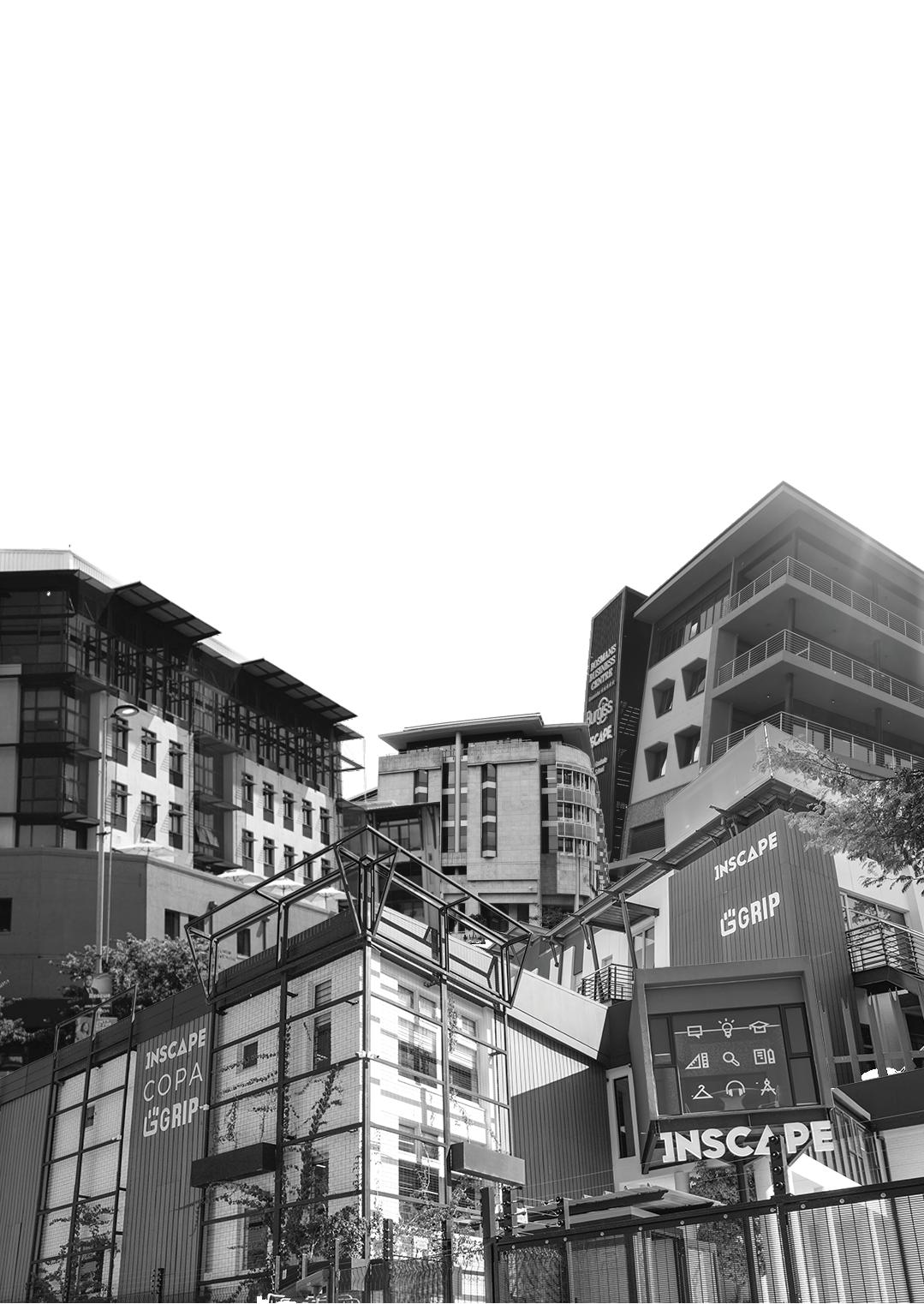

A comparative study of the ESG strategies of three diverse sectors in South Africa – retail, finance, and mining – and how each aligns its ESG initiatives with its unique operational imperatives.
By Dr Chris Blair, CEO, 21st Century
In today’s corporate landscape, Environmental, Social, and Governance (ESG) factors have become crucial indicators of a company’s long-term sustainability and ethical impact. These measures are essential not only for meeting regulatory requirements, but also for gaining investor confidence, fostering consumer loyalty, and ensuring operational resilience. However, the alignment of ESG measures with company strategy can vary significantly across industries. This article examines the ESG approaches of three companies, drawing on insights from their publicly available sustainability reports.

Before diving into the case studies, it is essential to understand why aligning ESG measures with company strategy is vital. ESG factors influence a company’s risk profile, reputation, and operational efficiency. When ESG measures are integrated into the core strategy, they can drive innovation, improve resource management, and enhance stakeholder relations. This alignment ensures that ESG initiatives are not just peripheral activities, but are embedded in the business model, driving sustainable growth. Since each industry faces distinct challenges and opportunities, their ESG strategies must be tailored accordingly, leading to diverse approaches and implementations.
Woolworths Holdings Limited stands out in the South African retail sector for its robust ESG strategy, detailed in its Annual Financial Statements and Sustainability Reports. The company’s Good Business Journey (GBJ) programme underscores its commitment to sustainability, focusing on reducing environmental impact, promoting fair trade, and enhancing community well-being.
Environmental initiatives: Woolworths has set ambitious targets to reduce carbon emissions, aiming for a 50% reduction by 2030. The company also focuses on sustainable sourcing, with a goal to source all its cotton from sustainable sources by 2025. These initiatives are detailed in their 2023 Sustainability Report.
Social initiatives: On the social front, Woolworths invests in community development through education and health programmes. The company’s employee wellness programmes are designed to ensure a supportive and inclusive workplace. Woolworths’ initiatives in these areas are thoroughly documented in their Annual Financial Statements.
Governance initiatives: Woolworths' governance practices emphasise ethical conduct and transparency, with a strong focus on board diversity and executive accountability. Their Remuneration Report outlines the alignment of executive pay with ESG performance, ensuring that leadership is incentivised to meet sustainability goals.
FirstRand Limited demonstrates how financial institutions can lead in ESG integration in the finance sector. As detailed in their Annual Financial Statements and Sustainability Reports, FirstRand’s ESG strategy is central to its operational ethos and risk management framework.
Environmental initiatives: FirstRand has committed to financing renewable energy projects and reducing its carbon footprint. The bank has established green bonds to support sustainable projects, as detailed in their 2023 Sustainability Report.
Social initiatives: FirstRand’s social initiatives focus on financial inclusion and education. The bank has developed products aimed at underserved communities, providing access to banking services that promote economic empowerment. Their Annual Financial Statements provide a detailed account of these initiatives.
Governance initiatives: In terms of governance, FirstRand emphasises strong risk management and regulatory compliance. The bank’s Remuneration Report reveals a structure where executive bonuses are tied to ESG performance metrics, ensuring that sustainability is a key consideration in leadership decisions.
The alignment of ESG measures with company strategy is critical for sustainable and ethical business operations.”
The mining sector presents unique ESG challenges, particularly in environmental management and community relations. Anglo American Platinum, a leading player in the industry, provides a compelling example of comprehensive ESG integration, as outlined in their Annual Financial Statements and Sustainability Reports.
Environmental initiatives: Anglo American Platinum has committed to achieving carbon neutrality by 2040. The company invests in water conservation and tailings management, crucial for minimising environmental impact. Their 2023 Sustainability Report details these efforts extensively, highlighting significant progress in reducing carbon emissions and enhancing water stewardship.
Social initiatives: The company’s social initiatives focus on local community development, health, and education. Anglo American Platinum works closely with communities to ensure that mining operations bring socio-economic benefits, as highlighted in their 2023 Sustainability Report.
Governance initiatives: Governance at Anglo American Platinum is characterised by rigorous oversight and ethical conduct. The company’s Remuneration Report shows how executive compensation is linked to achieving specific ESG targets, ensuring accountability at the highest levels of the organisation.
Each of these companies demonstrates that while the overarching goals of ESG strategies may be similar – enhancing sustainability, promoting social good, and ensuring robust governance – the specific measures and initiatives vary significantly depending on industry context and operational realities.
Retail vs. finance: Woolworths’ ESG focus is heavily tilted towards environmental sustainability and social impact, given its direct interaction with consumers and supply chains. In contrast, FirstRand's ESG strategy is deeply integrated with its financial products and services, emphasising financial inclusion and green financing.
Finance vs. mining: FirstRand and AngloAmerican Platinum both underscore the importance of governance and ethical conduct. However, while FirstRand’s environmental initiatives are finance-centric (e.g., green bonds), Anglo American’s are operationally focused, aiming to mitigate the direct environmental impact of mining activities.
Retail vs. mining: The retail sector’s ESG initiatives, as seen with Woolworths, are consumer and supply chain-focused, aiming for sustainable sourcing and community engagement. On the other hand, Anglo American Platinum’s ESG measures are centred around environmental management and local community development, addressing the broader impact of mining operations.
The alignment of ESG measures with company strategy is critical for sustainable and ethical business operations. The case studies of Woolworths, FirstRand, and Anglo-American Platinum illustrate how ESG strategies are tailored to fit industryspecific challenges and opportunities. By embedding ESG considerations into their core strategies, these companies not only meet regulatory requirements, but also drive long-term value creation and stakeholder trust. As the corporate world continues to evolve, the importance of a nuanced and industry-specific approach to ESG cannot be overstated. Each company must craft its own unique path, ensuring that its ESG strategy is a true reflection of its operational ethos and strategic vision. By comparing these diverse approaches, we see that no two ESG strategies are the same, as they are intricately linked to the unique operational and strategic needs of each company. This diversity is not only natural, but necessary for genuine and effective ESG integration.


South Africa’s construction industry faces a crippling threat: the “construction mafia”. This extortionist racket costs the country billions in lost revenue. But how do we protect businesses? Or is it easier to pay up?
By Lionel van Tonder, Director, Inge Swanepoel, Consultant, Martin Versfeld, Partner, and Tyron Theessen, Partner at Webber Wentzel
The issue of extortionist rackets impacting construction projects has escalated to such a degree that Police Minister Senzo Mchunu has namechecked the construction mafia several times in public since his appointment in July 2024, making it a priority for the current administration.
Clients regularly ask us, “What can I proactively do to protect my business from the construction mafia?”. We have also been engaged by businesses that felt they had little choice, but to accede to the construction mafia’s demands because the threat to bodily integrity and life, coupled with the cost of a work stoppage, was too high. These businesses recognise the construction mafia for the blight they are and continue to seek ways to extricate themselves from their respective situations.
Ironically, it is a well-intentioned legislation which has been hijacked by these bad actors.

The Preferential Procurement Policy Framework Act (PPPFA), which applies to public procurement, was designed to promote economic transformation by seeking to ensure that 30% of public procurement contracts (see Regulation 9) were allocated to specific previously disadvantaged groups to empower these qualifying individuals, promote equity and drive socio-economic transformation.
While the objectives of the PPPFA are undeniably laudable, the construction mafia has wilfully sought to distort its objectives by demanding a 30% share of a project’s contract value. In our experience, the construction mafia has no regard for the distinction between private and public procurement, deliberately conflating the two to extend their reach into private sector developments. Considerations of extortion aside, the company that wins a tender also faces the added difficulty that Regulation 9 stipulates that the tenderer (to ensure that the 30% allocation criteria is met) should select a supplier from a list of suppliers provided by the stateowned entity that issued the tender. Construction mafia groups are, unsurprisingly, not usually on any supplier list.
The Prevention and Combatting of Corrupt Activities Act (PRECCA) complicates matters further because it provides that it is an offence for any person to accept gratification or a bribe and to offer one. PRECCA also imposes a positive duty on any person in a position of authority to report corrupt acts (which is given a broad definition) where the monies involved exceed the sum of R100 000 (see section 34). Failure to do so gives rise to criminal liability, with penalties ranging from a fine to imprisonment of up to 10 years.
To aggravate matters, a company may also be exposed to an additional fine equal to five times the gratification or bribe which could prove ruinous. However, we see that coupled with the extortion, is a threat to the project and persons should the bad actors’ conduct be reported.
The Financial Intelligence Centre Act (FICA) also places an obligation on “accountable institutions” or “Reporting institutions” to report suspicious transactions or
The conundrum often faced by companies that win public tenders becomes quite apparent. They either have to withdraw their services (which in most instances they can ill afford to do and which would entail them repudiating their contracts and in so doing also exposing them to a potential damages claim), or they have to try and to negotiate an outcome with these bad-actors, which hopefully enables them to deliver the project on time, without risking the lives of their employees. The challenge is that while the companies in question are victims of unlawful behaviour, they are in turn acting unlawfully by engaging with an unlisted supplier. In addition, if the state-owned entity or branch of Government discovers that a non-listed entity has been sub-contracted, the winning bidders may run the risk of having their contract terminated and facing consequential damages claims.
The construction mafia typically relies on intimidation and violence to exert control over construction projects.”
activities to the Financial Intelligence Centre. Typically, Section 29 of FICA requires any person who carries on a business or who is in charge of, or manages a business, to report suspicious or unusual transactions to the Financial Intelligence Centre, if there is knowledge or suspicion that the transaction involves proceeds of unlawful activities, terrorist financing, circumventing a duty under FICA, or funds linked to the financing of terrorist or related activities.
While construction companies themselves may not always be explicitly designated as accountable institutions, they often engage in large-scale transactions and are sometimes exposed to potential misuse, such as extortion payments or “facilitation fees” that may be associated with organised crime (e.g. the construction mafia). These factors can lead to situations where they need to be vigilant for suspicious transactions, especially where there is a risk of money laundering or organised criminal activities.
While the PPPFA arguably created an unintended foothold for the construction mafia, we, fortunately, have the benefit of other legislation (including foreign frameworks), which (if enforced and/or adopted) can provide a strong foundation for combatting extortion, corruption and organised crimes.
The Prevention of Organised Crime Act (POCA) aims to address and dismantle organised crime, money laundering and gang activities. POCA enables asset forfeiture, allowing authorities to seize property linked to organised crime. For businesses, this can disrupt the financial means of construction mafia groups, making it harder for them to operate. When businesses co-operate with authorities under POCA, they can contribute to weakening these criminal networks.
If a United States-based company or subsidiary engages with the construction mafia in South Africa through bribery or facilitation payments, it can be held accountable under the US Foreign Corrupt Practices Act (FCPA). This broad jurisdiction empowers businesses to report bribes, extortion, or coercive demands by organised crime groups to US authorities, which can provide additional international support in tackling the issue. The FCPA mandates companies to implement and maintain robust internal accounting controls to prevent corrupt payments. For businesses in the construction industry, strong financial controls and regular audits make it easier to identify, deter and document attempted extortion or bribery demands. This is particularly helpful for businesses at risk of construction mafia influence, as internal controls can assist with avoiding being unwittingly involved in corrupt practices.
If a United Kingdom-based company or firm with a presence in the UK indirectly contributes to third-party entities associated with the construction mafia, it could face sanctions for failing to prevent bribery under the UK Bribery Act. This Act has international reach, enabling businesses to seek support and co-operation from UK authorities when dealing with cross-border issues. The Act also empowers businesses to refuse bribes or ‘protection payments’ demanded by the construction mafia under the risk of severe penalties. Similar to the FCPA, businesses impacted by the construction mafia can adopt anti-bribery policies compliant with the UK Bribery Act, which is beneficial in light of the UK
Economic Crime and Corporate Transparency Act (2023). This Act states that companies will need to have reasonable procedures in place to prevent fraud being committed by their associated persons (such as employees, agents, subsidiaries and other persons that perform services for or on their behalf) by 1 September 2025, so that they have the best chance of raising a defence if prosecuted for failing to prevent such wrongdoing.
In April 2024, the National Prosecuting Authority took matters a step further by publishing the Corporate Alternative Dispute Resolution (C-ADR) policy. The provisions of C-ADR enable companies affected by the likes of the construction mafia to make voluntary disclosures to the authorities. By doing so, the disclosing company protects themselves against the risk of actions or fines being initiated against them (in instances, for example, where they have succumbed to the demands of the construction mafia). The construction mafia typically relies on intimidation and violence to exert control over construction projects. C-ADR provides a formal, non-confrontational way to manage these disputes with the support of the authorities.
Companies affected by the construction mafia accordingly have, notionally at least, several potential options. Collaboration with law enforcement agencies, particularly forums such as the South African Police Service’s ‘Infrastructure Built Anti-Corruption Forum’ and the ‘National Priority Committee on Extortion and Violence at Economic Sites’. Companies can also engage with bodies such as the South African Forum of Civil Engineering Contractors of South Africa. We have noted and are encouraged by the increased levels of collaboration between government, civil society, and business.
Having engaged multiple businesses about how best to manage their exposure and the practical realities they face, particularly given the limited intervention (at least until very recently) on the part of law enforcement agencies, we have focussed on advising them on how to “get ahead of the game”. What do we mean by this? While it is beyond the remit of this article to engage in all the details, getting ahead entails amongst other strategies the following:

• Ensuring that staff are appropriately trained to deal with both legitimate and illegitimate community forums.
• Conducting thorough due diligence of the project site and stakeholders involved, to understand which community forums, other organised groups or businesses control the area and assess the feasibility of negotiating with them.
• Assuming that the forums and persons in question can be meaningfully negotiated with, establish which firms could provide the required services and establish which, for public tenders, are either listed as providers by the stateowned entity issuing the tender or whether they could be included in the list.
• Structuring downstream procurement in a manner that is fair, transparent and accessible.
• Agreeing with the community forum on what services will be provided by the community and what compensation will be paid in exchange.
• Ensuring (where possible) that the state-owned entity that issues the tender also participates in the negotiations with and is accountable to the local community forum.
• Ensuring appropriate measures to protect on-site equipment and employees. This should go beyond well-trained security staff and should include visible cameras and recording devices.
By engaging in these proactive strategies, legitimate community forums and businesses enjoy the recognition they deserve and the illicit construction mafia struggles to get the support they require from the communities they claim to represent. Beyond eroding construction mafia support and networks, community engagement and measures such as providing facilities or services can significantly bolster a company’s Environmental, Social and Governance scorecard, create meaningful future supply chains and create a positive legacy of beneficiation in the area they do business.
The options listed above have been provided as examples of some things that can be done and are, of course, not exhaustive. While we won’t be so bold as to claim that we have all the answers, we would certainly encourage you to ‘get ahead of the game’ by engaging with us or another suitable service provider to reduce the risks to your business associated with falling foul of the construction mafia.
To “get ahead of the game”, businesses can take proactive steps to manage their exposure to the construction mafia. These include:
• Training staff: to deal with legitimate and illegitimate community forums.
• Conducting due diligence: on project sites and stakeholders to understand which community forums or organised groups control the area.
• Establishing fair procurement practices: structuring downstream procurement to be fair, transparent, and accessible.
• Engaging with community forums: agreeing on services and compensation to be provided by the community.
• Protecting onsite equipment and employees: implementing visible security measures and reporting suspicious transactions.
By taking these proactive steps, businesses can reduce their risks and contribute to weakening the construction mafia’s grip on the industry. Proactive strategies
